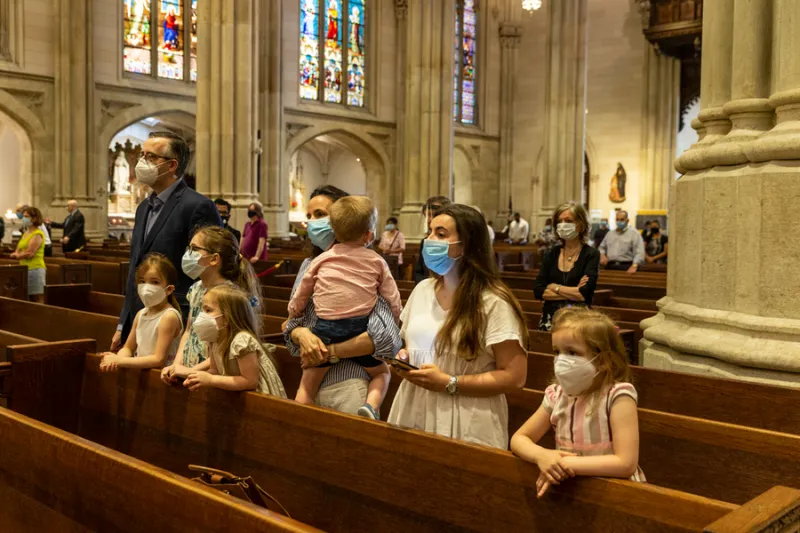 A family prays at St. Patrick’s Cathedral in New York City, June 2020 / lev radin/Shutterstock
A family prays at St. Patrick’s Cathedral in New York City, June 2020 / lev radin/Shutterstock
Washington D.C., Apr 28, 2021 / 15:00 pm (CNA).
The Diocese of Providence is transitioning toward “normal liturgical practices” following new public health guidelines from the state of Rhode Island.
“Now that many of the restrictions imposed on gatherings in our state have been lifted, we are overjoyed to return to a more normal liturgical experience,” Fr. Jeremy Rodrigues, the diocese’s director of divine worship, told CNA in a statement.
“This also affords us the opportunity to reinvigorate our parishes and appreciate the beauty that is the Catholic Mass,” Fr. Rodrigues said.
The new diocesan protocols will go into effect on May 7, and are aimed at creating a more welcoming environment to parishioners by eliminating “any unnecessary social restrictions on the faithful.”
The diocese said that the faithful should be encouraged to attend Mass during the week and “especially” on Sundays, but it is still dispensing Catholics from their obligation to attend Mass on Sundays and Holy Days of Obligation.
Under the new protocols, capacity at churches will be increased from 75% to 80%, and social distancing will decrease from six to three feet between families or individuals. Pews once roped off to enforce the six-foot distancing measures will be available for seating again. Parishes should stop requiring parishioners to reserve seats at Mass, and “markings, tape, plexiglass, and other signage related to COVID restrictions should be removed,” the diocese directed.
Fr. Rodrigues praised parishes for acting to prevent any traceable outbreaks of COVID-19.
“It is very encouraging to the faithful that our parishes have done so well in the midst of the pandemic keeping everyone safe and healthy. There have been zero traceable outbreaks in all of our parishes,” he said.
Celebrants of Mass and ministers are no longer required to wear masks under the new diocesan standards, and altar servers and lectors are encouraged to participate at Mass once again – as well as extraordinary ministers “if necessary.”
The new guidelines allow for liturgical processions to and from the altar, and hymnals and other worship aids can be placed in the pews.
The diocese encouraged choirs to begin singing again while adhering to social distancing standards. Churches can again fill their Holy Water fonts and ushers may again use offertory baskets.
Parishioners are now allowed to offer the Sign of Peace but with no physical contact. This should “simply be done verbally,” the diocese said.
Holy Communion no longer needs to be distributed after the final blessing. The diocese also stated that “the lay faithful should be reminded that they may receive Holy Communion either on the hand or on the tongue.”
The use of harsh chemicals on the pews or the sanitization of the church after every Mass is no longer necessary, the diocese said.
Certain protocols will be kept in place by the diocese, including the availability of hand sanitizing dispensers at church vestibules, and the wearing of face masks indoors for large gatherings – except in cases of individual health concerns.
The diocese maintained that distribution of the Precious Blood is suspended for the lay faithful. Parishes must still allow for proper ventilation for increased airflow, and HVAC filtration when possible. Parishioners must still avoid unnecessary crowding at the entrances of the church and in the aisles whenever possible.
The diocese allows for members of the same household to forgo social distancing in pews but for those who aren’t it is still encouraged.

[…]


